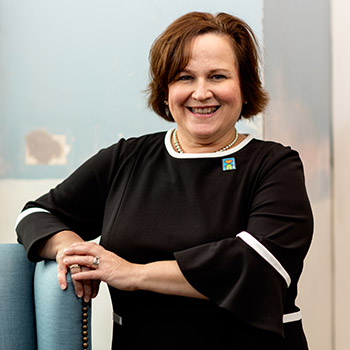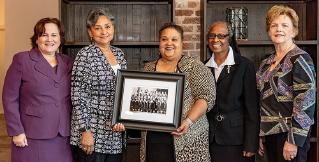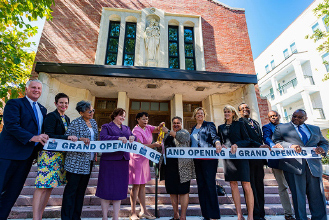New Orleans has always been a colorful and diverse city, known for its great food, jazz and zydeco music, French Creole architecture, and multilingual and cultural heritage. It's home to "laisse le bon temps rouler" or "let the good times roll," a laidback approach to living. But the good times don't always roll for less-fortunate populations in the New Orleans area, particularly when it comes to safe, sustainable and affordable housing. The issue took on new scope and challenges after the destruction caused by Hurricane Katrina in 2005 and was made worse after the demolition of housing in lower-income neighborhoods as part of the city's redevelopment after the hurricane.
 That's where the resources and experience of an organization such as Providence Community Housing comes into play. Providence is led by CEO Terri North, who brought broad experience in nonprofit work, finance and affordable real estate development to her role as the organization's chief executive. Since 2006, North and her team have developed more than 1,300 units of housing and helped more than 600 individuals and families become homeowners throughout the Greater New Orleans Area.
That's where the resources and experience of an organization such as Providence Community Housing comes into play. Providence is led by CEO Terri North, who brought broad experience in nonprofit work, finance and affordable real estate development to her role as the organization's chief executive. Since 2006, North and her team have developed more than 1,300 units of housing and helped more than 600 individuals and families become homeowners throughout the Greater New Orleans Area.
North took the time to chat with us during Women's History Month to discuss her role at Providence and her approach to affordable housing, Providence's work in this area, and the opportunities and challenges she sees for her organization and community development as a whole in the near future.
How have your previous professional roles prepared you for the work at Providence Community Housing?
With a background in banking and finance, I had a good foundation set for the demands of real estate development work. Honing in on those skills during my 20-year tenure with the Archdiocese of New Orleans has solidified my expertise in affordable housing real estate development. During my dual-role consultancy with both the Archdiocese and Christopher Homes, Inc., I worked on the refinancing and rehabilitation of 13 Section 202 housing properties totaling 1,200 senior rental housing serving low-income elderly populations.I also facilitated the development and implementation of an archdiocesan strategic plan for over 72 elementary schools. Prior to this work, I worked for Willwoods Community, a Catholic nonprofit that develops, owns and manages affordable rental housing in addition to their other lines of business. Here, I managed financial operations and provided financial analysis where I coordinated the financial structuring and participated in the redevelopment of low-income and elderly low-income housing using a combination of low-income housing tax credits, historic tax credits, HOME funds, HUD Mark to Market debt, and private permanent mortgage debt.
How do you feel that Providence has had the greatest impact in the community, and what role do you play in that?
Since our inception in response to the critical need for housing in post-Hurricane Katrina New Orleans, we have developed affordable homes for over 2,100 renters, and facilitated the homebuying process for over 600 individuals and families. As one of three organizational founders, I was instrumental to building the foundation of the organization early on. Now in the role of CEO, it's my duty to ensure that quality homes are an affordable option for individuals and families long-term. As CEO, it's my responsibility to bring in partners and investors to make that happen.
What lessons have you learned in responding to recent weather disasters? How do you ensure that your organization and community is as prepared as possible?
Providence adopted and deployed an organizational disaster plan that is reviewed annually. Each of our properties also has a disaster plan with different levels of response that take into account the present situation or circumstance. Our responsibility to our residents extends beyond structural reinforcement and support. We assist with our residents' needs, especially in storm- and other weather-related circumstances.How do you leverage the NeighborWorks network to help in times of crisis, such as storm relief?
Being established in response to the major hurricane event of 2005 in New Orleans, we were not a NeighborWorks organization at the time. However, our experience and expertise in the area of rebuilding and disaster redevelopment has allowed us the opportunity to reach out and advise our network counterparts in the event that they are called to respond to their own area crises.What do you see as the biggest opportunities for the organization?
Providence has a strong bandwidth and financial infrastructure that has been leveraged and grown over time to allow us the capacity to acquire and preserve housing in an effort toward long-term affordable housing preservation. To that end, we continue to seek out opportunities to establish or preserve housing options that are affordable for individuals and families across the Greater New Orleans area.Where is there room for improvement? What are the areas you feel that are the most challenging currently?
As with most nonprofit organizations, funding and financing will always be priority areas to address. We also identify several aspects of business development as challenging areas for organizations doing this work, namely:- Access to real-time development information that is up-to-date and accurate.
- Maintaining/collecting/analyzing data to better serve residents.
- Data resources related to real estate development opportunities.
How do you see intersection among affordable house, improved health and vibrant communities?
Quality housing that is affordable and accessible is the cornerstone to health, both for individuals and families as well as for whole communities. When you make housing that is affordable and accessible, families don't have to face the hard decisions related to nutrition and health because they have additional money to put towards these things. Many older structures contain air pollutants and toxic substances that lead to asthma and other respiratory illnesses that keep children indoors and away from physical activities. Quality homes provide a refuge from the pollutants and also lead to healthier kids who are able to participate in outdoor and physical activities that promote healthy lifestyles. At Providence, we provide green space and play space so that children have opportunities to get out of the home and play outside. We make it a priority to provide more than housing for our residents. We also provide access to resources and support services for our families and we partner with community-based organizations to increase access to opportunities and promote community engagement among residents.
How do you successfully engage with the people in the community?
Our resident service staff as well as our community outreach and engagement activities are instrumental to keeping us tied to the communities that we serve. Our property management and resident service staff at our properties are in constant contact with residents and provide everything from social time and field trips to commodities and case management. Our community partners provide services related to health and well-being, medication management, financial literacy, job training and youth development. We also participate in community-based events and programs, promote the good works taking place in our community, and have an active presence in the communities we serve.Finish this sentence: It would be impossible for Providence to achieve its mission without…
Partnership. Whether it is a co-developer, a funder/investor, a community partner or our local/state/federal government, it is through strong partnerships that Providence is able to have such impact in the community.What is the biggest issue facing affordable housing in the next five years (in your area and overall)?
Overall, rising rents and an increase in the rent-burdened population is an issue that will continue to plague our communities over the coming years. Locally, Providence is exploring options to address those properties entering into year 15 of post-Katrina disaster funding that are coming up for expiration over the next three to five years.What is the biggest issue facing community development in the next five years (in your area and overall)?
Overall, sustainability and communicating what real impact we're having in the communities we serve are among the biggest challenges I see facing community development efforts in the coming years. Locally, our challenges are in our city's residents maintaining a commitment to community beyond the one-off experiences of Mardi Gras and Jazz Fest, connecting to our communities in a deeper and more long-term way that replaces the basics of tolerance with a greater harmonious effort toward acceptance, engagement and inclusion.Editor's note: Would you like to meet with Terri and her team? Join us in New Orleans for the next NeighborWorks Training Institute, held Aug. 19-23. Don't miss the symposium, "Closing the Life Expectancy Gap" on Aug. 21. Network with more than 1,800 colleagues from all over the country and enjoy top-notch training in community development and nonprofit management.

